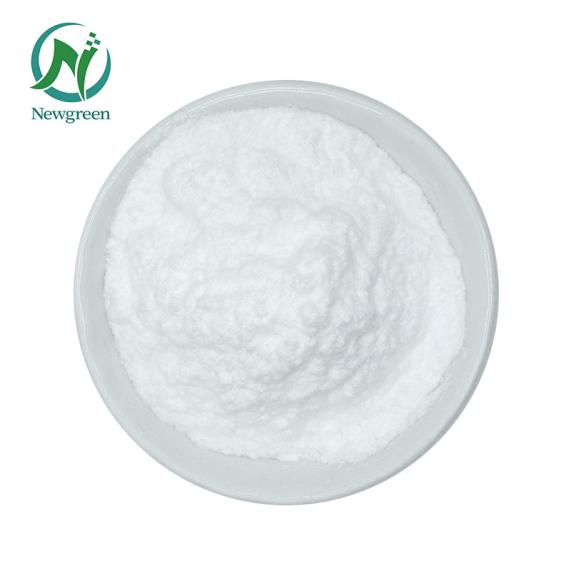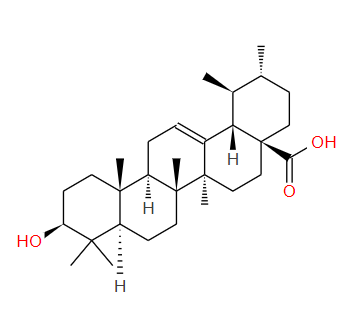
What Is Ursolic Acid ?
Ursolic acid is a natural compound found in various plants, including apple peels, rosemary, and basil. It is known for its potential health benefits and has been studied for its anti-inflammatory, antioxidant, and anti-cancer properties. Ursolic acid has also been investigated for its potential effects on muscle growth and metabolism, making it of interest in the fields of sports nutrition and metabolic health.
Research suggests that ursolic acid may have a range of potential health benefits, including supporting skin health, promoting muscle growth, and exhibiting anti-inflammatory effects. It's important to note that while ursolic acid shows promise, further research is needed to fully understand its effects and optimal uses
Physical and Chemical Properties of Ursolic Acid
Ursolic acid is a natural compound with several notable physical and chemical properties:
1. Molecular Structure: Ursolic acid, also known as 3-beta-hydroxy-urs-12-en-28-oic acid, has a pentacyclic triterpenoid structure.
2. Physical Form: Ursolic acid is a white, waxy solid at room temperature. It is insoluble in water but soluble in organic solvents such as ethanol, methanol, and chloroform.
3. Melting Point: The melting point of ursolic acid is approximately 283-285°C.
4. Chemical Properties: Ursolic acid exhibits various chemical properties, including antioxidant, anti-inflammatory, and anti-cancer activities. It is also known for its potential to inhibit the growth of certain microorganisms.


Extraction Source Of Ursolic Acid
Ursolic acid can be extracted from various plant sources, and some of the common extraction sources include:
1. Apple Peels: Ursolic acid is found in the peels of apples, and apple pomace (the solid remains after pressing apples for juice) is a common source for extracting ursolic acid.
2. Rosemary: Ursolic acid is present in the leaves of the rosemary plant, and it can be extracted from this botanical source.
3. Holy Basil (Ocimum sanctum): Holy basil, also known as tulsi, is another plant that contains ursolic acid and can serve as a source for its extraction.
4. Loquat Leaves: Ursolic acid can also be extracted from the leaves of the loquat tree (Eriobotrya japonica).
These are just a few examples of plant sources from which ursolic acid can be extracted. The compound is present in various other plants as well, and the extraction process typically involves using solvents and techniques to isolate and purify ursolic acid from the plant material.
What Is The Benefit Of Ursolic Acid ?
Ursolic acid has been the subject of research due to its potential health benefits. Some of the reported benefits of ursolic acid include:
1. Anti-inflammatory Properties: Ursolic acid has been studied for its anti-inflammatory effects, which may be beneficial for conditions involving inflammation.
2. Antioxidant Activity: Ursolic acid exhibits antioxidant properties, which can help protect cells from oxidative stress and damage caused by free radicals.
3. Potential Anti-Cancer Effects: Research suggests that ursolic acid may have anti-cancer properties, showing promise in inhibiting the growth of certain cancer cells.
4. Muscle Growth and Metabolism: Ursolic acid has been investigated for its potential to promote muscle growth and improve metabolic health, making it of interest in the fields of sports nutrition and metabolic disorders.
5. Skin Health: Ursolic acid has been studied for its potential benefits for skin health, including its role in promoting collagen production and its anti-aging effects.
What Is The Applications Of Ursolic Acid ?
Ursolic acid has a range of potential applications due to its reported health benefits and biological properties. Some of the applications of ursolic acid include:
1. Cosmetic and Skincare Products: Ursolic acid is used in various cosmetic and skincare products due to its potential to promote skin health, including its reported anti-aging and anti-inflammatory effects.
2. Nutraceuticals and Dietary Supplements: Ursolic acid is used in the formulation of nutraceuticals and dietary supplements targeting muscle growth, metabolic health, and overall well-being.
3. Pharmaceutical Research: Ursolic acid is a subject of ongoing research in pharmaceutical development, particularly in the investigation of its potential anti-cancer and anti-inflammatory properties.
4. Sports Nutrition: Due to its potential to promote muscle growth and improve metabolic health, ursolic acid is of interest in the field of sports nutrition and the development of supplements for athletes and fitness enthusiasts.
5. Traditional Medicine: In some traditional medicine systems, certain plant sources of ursolic acid have been used for their reported health benefits, and the compound continues to be studied for its potential therapeutic applications.
What Is The Side Effect Of Ursolic Acid ?
As of now, there is limited information available regarding the specific side effects of ursolic acid in humans. However, as with any natural compound or supplement, it's important to consider potential side effects and exercise caution, especially when using it in concentrated forms or in high doses.
Some general considerations for the potential side effects of ursolic acid may include:
1. Gastrointestinal Distress: In some cases, high doses of natural compounds can lead to gastrointestinal discomfort, such as nausea, diarrhea, or stomach upset.
2. Interactions with Medications: Ursolic acid may interact with certain medications, particularly those metabolized by the liver. It's important to consult with a healthcare professional if you are taking other medications to assess potential interactions.
3. Allergic Reactions: Some individuals may be sensitive or allergic to ursolic acid or the plant sources from which it is derived, leading to allergic reactions.
4. Other Considerations: Due to the diverse potential effects of ursolic acid, it's important to approach its use with caution, especially if you have specific health conditions or concerns.
It's advisable to consult with a healthcare professional before using ursolic acid, especially if you have specific health concerns or are taking other medications. This will help ensure that the use of ursolic acid is appropriate for your individual health needs and to discuss any potential side effects or considerations.

Related Questions You May Interested In :
Is it safe to take ursolic acid ?
The safety of taking ursolic acid as a supplement has not been extensively studied, and there is limited information available regarding its safety profile in humans. As with any supplement or natural compound, it's important to approach its use with caution and to consult with a healthcare professional before taking ursolic acid, especially in concentrated forms or in high doses.
While ursolic acid is naturally occurring in certain plant sources and has been investigated for its potential health benefits, it's essential to consider potential side effects, interactions with medications, and individual health considerations before using it as a supplement.
Given the limited information available, it's advisable to seek guidance from a healthcare professional to determine the safety and appropriateness of taking ursolic acid based on individual health status and potential interactions with other substances. This will help ensure that the use of ursolic acid is aligned with your specific health needs and to discuss any potential safety considerations.
Is ursolic acid natural ?
Yes, ursolic acid is a natural compound. It is a pentacyclic triterpenoid compound that is found in various plant sources, including apple peels, rosemary, holy basil, and loquat leaves. As a natural compound, ursolic acid is of interest in pharmaceutical, cosmetic, and nutraceutical research due to its reported health benefits and potential applications.
Does ursolic acid build muscle ?
Ursolic acid has been studied for its potential to promote muscle growth and improve metabolic health. Research suggests that ursolic acid may have anabolic effects, which could contribute to its ability to support muscle growth. Additionally, it has been investigated for its potential to enhance skeletal muscle function and metabolism.
What does ursolic acid do for the liver ?
Ursolic acid has been studied for its potential hepatoprotective effects, meaning it may have a protective role in liver health. Research suggests that ursolic acid may help support liver function and protect against liver damage caused by various factors such as oxidative stress, inflammation, and toxins.
Some studies have indicated that ursolic acid exhibits antioxidant and anti-inflammatory properties, which could contribute to its potential benefits for liver health. Additionally, it has been investigated for its ability to modulate lipid metabolism and reduce fat accumulation in the liver, which may be beneficial for conditions such as non-alcoholic fatty liver disease (NAFLD).
While the research on ursolic acid's effects on liver health is promising, further studies are needed to fully understand its mechanisms and optimal uses. As with any supplement or natural compound, it's advisable to consult with a healthcare professional before using ursolic acid for specific health-related purposes, including its potential role in supporting liver function.
How much ursolic acid per day ?
The optimal daily dosage of ursolic acid has not been firmly established, as research on its supplementation is still ongoing. Since individual responses to supplements can vary, it's important to consult with a healthcare professional or a qualified nutritionist to determine the appropriate dosage based on factors such as age, weight, overall health, and specific health goals.
As with any dietary supplement, it's crucial to seek guidance from a healthcare professional before starting ursolic acid supplementation to ensure that it aligns with your individual health needs and to discuss the appropriate dosage for your specific circumstances.
Post time: Sep-11-2024





